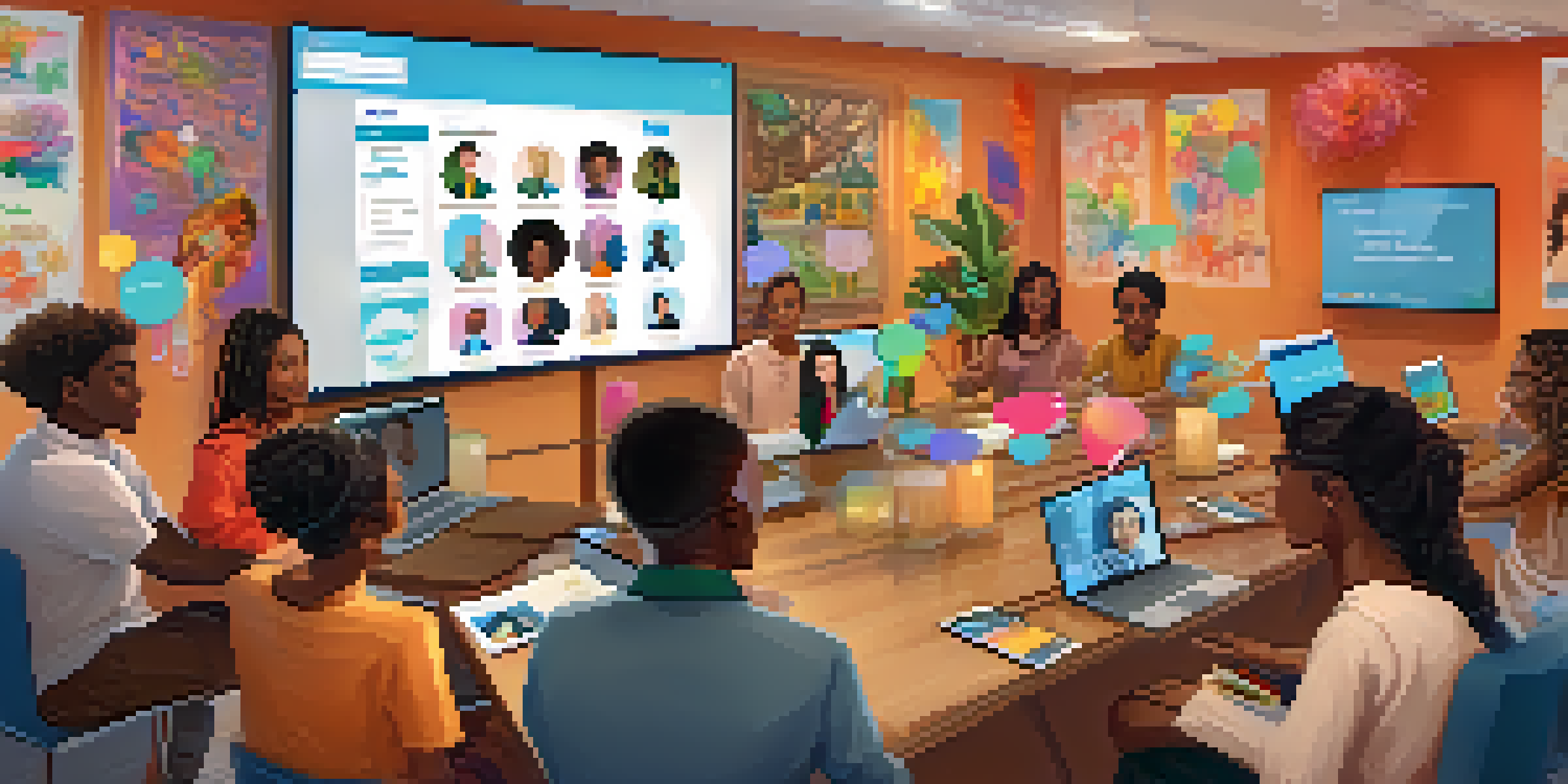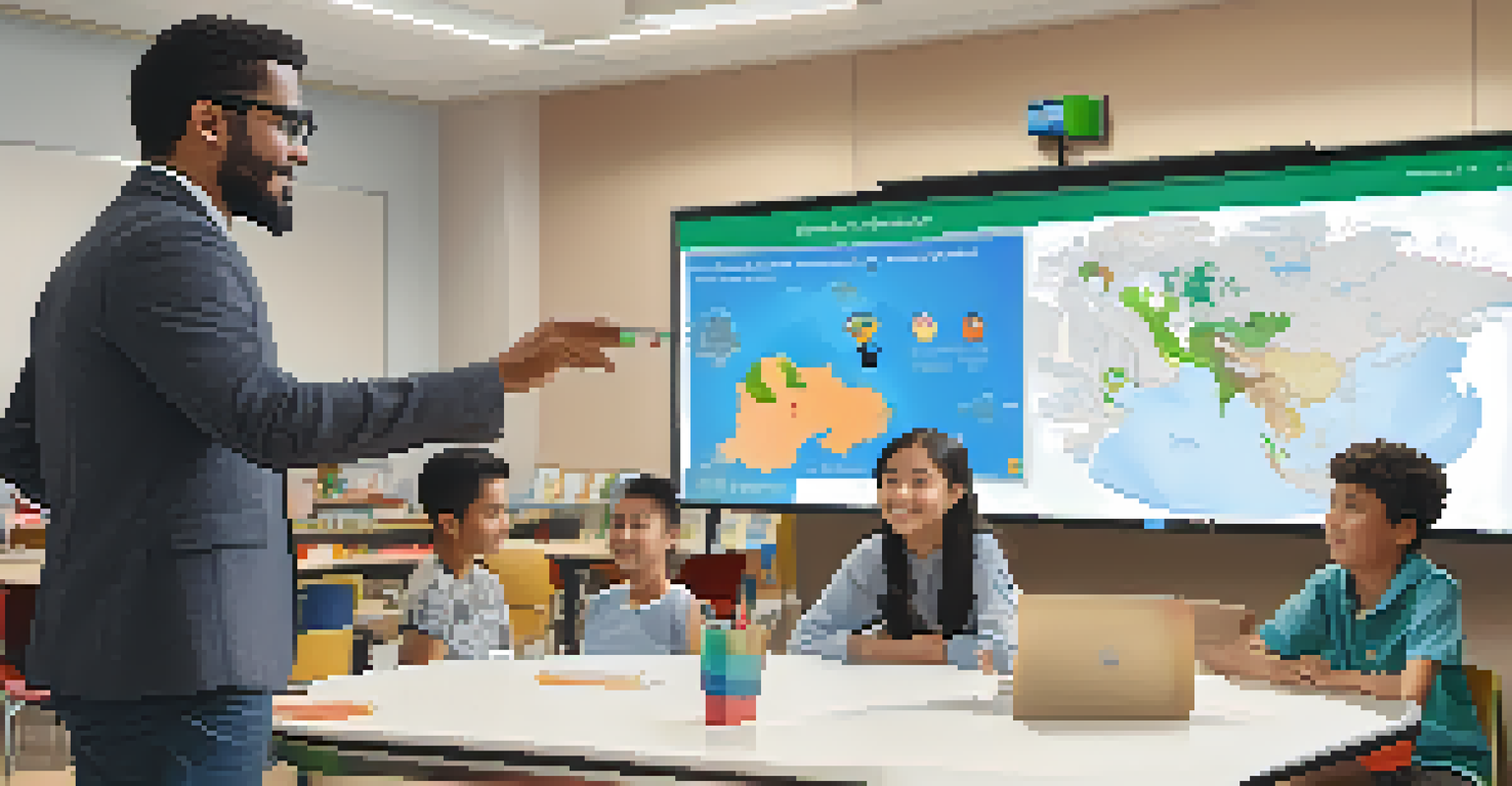The Role of Cultural Competence in Online Education

What is Cultural Competence in Education?
Cultural competence refers to the ability to understand, communicate with, and effectively interact with people across cultures. In education, this means recognizing the diverse backgrounds of students and adapting teaching methods accordingly. It involves not just awareness, but also skills and practices that promote inclusivity and respect for all learners.
Cultural competence is the ability to understand, communicate with, and effectively interact with people across cultures.
For instance, an educator who acknowledges the cultural significance of certain holidays can create a more inclusive curriculum that resonates with all students. This understanding helps build a supportive learning environment, where students feel valued and understood. Ultimately, cultural competence allows educators to meet the needs of a diverse student body more effectively.
In online education, where students from various cultures may interact, cultural competence becomes even more critical. Online platforms can sometimes strip away the personal touch of face-to-face learning, making it essential for educators to be proactive in fostering an inclusive atmosphere.
The Importance of Cultural Competence in Online Learning
Cultural competence is crucial in online learning environments as they often bring together students from various geographical and cultural backgrounds. This diversity can enrich the learning experience, but it also presents challenges if not navigated thoughtfully. By fostering cultural competence, educators can create a more engaging and equitable online classroom.

For example, when students feel that their cultural perspectives are acknowledged and respected, they are more likely to participate actively in discussions. This engagement not only enhances their learning experience but also promotes a sense of belonging within the online community. Ultimately, this leads to better educational outcomes for all students.
Cultural Competence Enhances Learning
Understanding and respecting diverse cultural backgrounds improves student engagement and creates a supportive learning environment.
Moreover, cultural competence helps reduce misunderstandings and conflicts that may arise from cultural differences. Educators who are sensitive to these differences can facilitate smoother interactions and discussions, creating a more harmonious online learning environment.
Strategies for Developing Cultural Competence
Developing cultural competence in online education requires intentional effort from educators. One effective strategy is to engage in continuous professional development focused on diversity and inclusion. Workshops, webinars, and reading materials can provide valuable insights into cultural differences and effective teaching practices.
Diversity is not a reason to be afraid; it is a reason to embrace the difference and learn from each other.
Additionally, incorporating diverse perspectives into the curriculum is vital. This can involve including literature, case studies, and examples from various cultures, which can help students see themselves reflected in their learning materials. Such inclusivity not only enriches the curriculum but also fosters respect and understanding among students.
Lastly, actively seeking feedback from students about their experiences can also enhance cultural competence. This feedback can guide educators in adjusting their approaches and materials to better meet the diverse needs of their students.
Creating Inclusive Online Learning Environments
An inclusive online learning environment is one where all students feel welcomed, respected, and valued. This can be achieved by establishing clear communication channels and encouraging open discussions about cultural differences. Educators should create a space where students can share their experiences and perspectives without fear of judgment.
Using technology to facilitate group work can also promote inclusivity. By assigning students to diverse groups, educators can encourage collaboration and understanding among peers from different cultural backgrounds. This not only enhances learning but also builds community within the online classroom.
Inclusivity in Online Classrooms
Creating inclusive online learning spaces fosters collaboration and understanding among students from various cultures.
Additionally, educators can set clear expectations for respectful communication and interaction. By establishing ground rules, students are more likely to engage positively and constructively with one another, fostering a sense of belonging.
The Role of Technology in Supporting Cultural Competence
Technology plays a significant role in enhancing cultural competence in online education. Various tools and platforms can facilitate communication and collaboration among students from different backgrounds. For example, discussion forums and video conferencing can bridge geographical gaps and foster real-time interactions.
Furthermore, educational technologies can provide access to a wealth of resources that reflect diverse cultures. Online libraries, databases, and multimedia resources can expose students to different perspectives, enriching their learning experience. This access helps students gain a broader understanding of global issues and cultural contexts.
Moreover, technology can also support personalized learning experiences. Adaptive learning platforms can cater to individual learning styles and preferences, ensuring that all students receive the support they need to succeed.
Overcoming Challenges in Cultural Competence Implementation
While fostering cultural competence in online education is essential, it does come with its challenges. One common obstacle is the lack of awareness or understanding of cultural issues among educators. To overcome this, institutions can provide training and resources that help educators recognize their biases and develop more inclusive practices.
Another challenge is the potential for miscommunication in online interactions. Without the non-verbal cues present in face-to-face communication, misunderstandings can easily occur. Educators can mitigate this by encouraging clarity in communication and promoting a culture of patience and understanding.
Technology Supports Cultural Awareness
Educational technologies facilitate communication and access to diverse resources, enhancing cultural competence in online education.
Lastly, resistance to change can also hinder the implementation of culturally competent practices. By fostering an open dialogue about the importance of inclusivity and demonstrating the benefits to students, educators can gradually shift mindsets and promote a more culturally aware approach to online education.
The Future of Cultural Competence in Online Education
As online education continues to evolve, the importance of cultural competence will only grow. With the increasing globalization of education, understanding cultural differences will be crucial for both educators and students. This means that training programs and educational policies must prioritize cultural competence as a core component.
In the future, we can expect to see more diverse curricula that reflect global perspectives. The integration of technology will also enhance opportunities for collaboration among students from different cultures, fostering a richer learning environment. This evolution will help prepare students for a more interconnected world.

Ultimately, fostering cultural competence in online education is not just about improving learning outcomes; it's also about building a more inclusive and empathetic society. As we embrace diversity in our educational practices, we pave the way for a brighter, more understanding future.